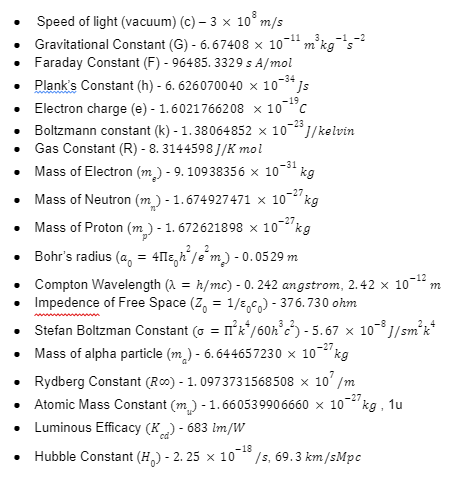Physical constants have seemed as foundational conserved quantities across all formulas of the basic science and with their implementation in the actual world. Moreover, they have particular and ubiquitously used signifiers or the symbols that have such relevance that they should be recognized as greater accuracy that can be achieved.
The fundamental physical constant, also known as the basic constant or the global variable, is a physical number that is thought to be universally applicable and has an always-constant value.
Physical constants are referred to by several names, universal constants fundamental constants, etc. It is critical to use a precise value of the physical constant since their correctness will assist to verify how correct the concepts and theories are, and because they constitute the foundation of Physics as well as their precision permits wide applicability to be produced based on particular ideas. Physical constants are important values that exist in physical theoretical formulas and equations as well as in real-world uses.
Why Constants?
In physics, people interact with several measurements, and to determine the measurements of an object or entity, the duration of an occurrence, or the volume of a liquid, we must contrast it with other elements that we utilize as a comparison reference. All of those are physical constants like the light speed (c), the potential of electrons (e), the gravitational constant (G), the acceleration due to gravity (g), etc.
For example, to measure the gravity of any planet. We first compare it with zero and then to understand it we compare it with the gravitational acceleration of our planet which is g=9.81 m/s, a constant.
Physical constants remain the same in every condition
They are used to find out important concepts in physics and therefore they have to be constant in different conditions. To understand better consider this example the velocity of light is a fundamental universal fact or constant denoted by c. The speed of light may be investigated using both theories of electromagnetism and the theory of relativity, it is based on the power or energy with the equation of mass, which can be expressed as E = mc2. The measurement of the light’s speed never varies and is independent of any experimental circumstances, but the velocity of a sound wave can fluctuate in some instances hence, the speed of light value is a fact and a universal constant that can never change.
Few Important Physical Constants
Some important physical constants and formulas used in physical equations are given below:

Conclusion
To sum up, physical constants are given by the scientist studying them. They can be also referred to by other names such as universal constants or fundamental constants. It is used to relate a particualr phenomenon to another phenomenon and thus their values remain the same under different conditions. The value of these constants is very precise as they determine the foundation of physics. If any value changes many other phenomena related to that value change. Thus every calculation they are always taken very precisely. A few examples of important physical constants are Atomic mass constants, the mass of electron, proton, and neutron, Hubble Constant, and Plank’s constant. The name of these constants is given by their founder and kept in their name themselves. As Plank found the Plank’s constant. Moreover, Physical quantities and formulas are also used in theories of organic chemistry.
 Profile
Profile Settings
Settings Refer your friends
Refer your friends Sign out
Sign out











